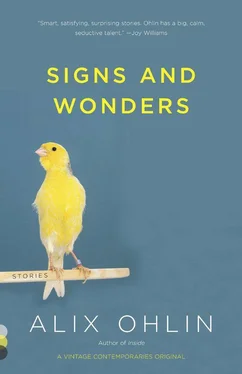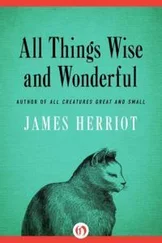Alix Ohlin - Signs and Wonders
Здесь есть возможность читать онлайн «Alix Ohlin - Signs and Wonders» весь текст электронной книги совершенно бесплатно (целиком полную версию без сокращений). В некоторых случаях можно слушать аудио, скачать через торрент в формате fb2 и присутствует краткое содержание. Год выпуска: 2012, ISBN: 2012, Издательство: Random House, Inc., Жанр: Современная проза, на английском языке. Описание произведения, (предисловие) а так же отзывы посетителей доступны на портале библиотеки ЛибКат.
- Название:Signs and Wonders
- Автор:
- Издательство:Random House, Inc.
- Жанр:
- Год:2012
- ISBN:9780307948649
- Рейтинг книги:3 / 5. Голосов: 1
-
Избранное:Добавить в избранное
- Отзывы:
-
Ваша оценка:
- 60
- 1
- 2
- 3
- 4
- 5
Signs and Wonders: краткое содержание, описание и аннотация
Предлагаем к чтению аннотацию, описание, краткое содержание или предисловие (зависит от того, что написал сам автор книги «Signs and Wonders»). Если вы не нашли необходимую информацию о книге — напишите в комментариях, мы постараемся отыскать её.
Signs and Wonders — читать онлайн бесплатно полную книгу (весь текст) целиком
Ниже представлен текст книги, разбитый по страницам. Система сохранения места последней прочитанной страницы, позволяет с удобством читать онлайн бесплатно книгу «Signs and Wonders», без необходимости каждый раз заново искать на чём Вы остановились. Поставьте закладку, и сможете в любой момент перейти на страницу, на которой закончили чтение.
Интервал:
Закладка:
Also, this: he didn’t look at her the same way. He didn’t look at her much at all.
Maybe this was temporary. It was a time of adjustment, necessarily difficult. They were bound to lose themselves a little. Maybe they’d have a good night, with a friend, and be grown-ups together — though of all people, she thought, it was a shame they had to be grown-ups with Dilrod.
He showed up at eight, an hour late, smelling of vodka and cigarettes, hugging them both a little too hard. His name wasn’t actually Dilrod, it was Alan Dilworth; but in high school Dilrod sounded funnier. While she reheated the pad thai in the microwave Stefan made drinks, asking all about the new woman, where they’d met, who she was.
“She’s awesome,” Dilrod said. “She drove me to the airport so that I wouldn’t have to pay for long-term parking. Finally I’ve met somebody who anticipates my needs instead of putting herself first.”
Jill held back a snort. To say this was the source of Dilrod’s relationship problems was so off-base as to belong in a different country from the base, a different solar system. What killed her about Dilrod’s women was that they were invariably intelligent, attractive, and reasonably successful; they were independent filmmakers, schoolteachers, dental hygienists. She always thought they could do better than Dilrod, but apparently they couldn’t.
Though he wasn’t, she had to admit, bad-looking. His vibe was teenage prepster gone to seed: chest muscled but stomach slightly paunched, his wispy blond hair like dandelion weed around his head, his eyes a little bloodshot but still a piercing blue. He wore striped collared shirts and frayed khakis. He was in sales for some computer company and had managed to hold on to his position despite the tumult of the past ten years, so he must have been good at it, or at least had a knack for survival. He stood in the kitchen with a drink in his hand, gesturing, his mouth open, so obviously happy to see Stefan that you had to like him for it. He’d added two days on to his business trip just to see them.
“So, dude,” he was saying, “you’ve got to come out and meet her. Come next month, for my birthday. Take some time off work.”
“Things are crazy right now.”
“You always say that, dude.”
“It’s always true.”
Stefan was happy too, laughing and shaking his head at everything Dilrod was saying. They would never hug each other, these two, nor write or call during the intervals when they were apart; but stick them in a room together and they almost swooned with affection.
She put the food out, and they ate. Phoebe’d been so fussy that Jill had curtailed her diet drastically, restricting all but the blandest foods, and now the shrimp exploded on her tongue. Would all experiences be as dramatic as this when she experienced them again, this time as a mother — spicy food, alcohol, sex? She was still waiting for that last one, waiting for both of them to feel something other than exhausted. Dilrod was telling a long story about his ex-wife and her frightening Croatian mother. Stefan was laughing, harder than seemed warranted. Jill sat back and let her attention wander. Being a mother was all about attention, every moment on a hair trigger, alert for the baby’s cry. But right now Phoebe was asleep, thank God, and she’d let herself drink half a glass of wine and her mind go pleasantly blank. She felt her muscles, her body, the container of her physical self, as if for the first time in years.
“Sweetest,” Stefan said, smiling, “I think you’re falling asleep.”
For an hour or so she nodded off with the baby, and when she came back they were arguing. From the other room it had sounded serious, but it turned out to be about movies. In particular, a director whose films Stefan loved and Dilrod thought was ridiculous.
“Any time there’s a mansion in a movie,” Dilrod was saying, “and in that mansion there’s a tent, and inside that tent there’s a person listening to Nick Drake — I hate that person and I hate that movie.”
“I love Nick Drake,” Stefan said, slurring a little. During the time she’d been gone, they’d finished off the vodka.
“You know who I’m into lately?” Dilrod said, shifting in his seat. “Billy Joel. Valerie and I saw him in concert last summer and I have to say he totally rocked.”
“You can’t sit there telling me that you hate Nick Drake and Billy Joel totally rocked. This is an impossible statement.”
“ ‘This is an impossible statement,’ ” Dilrod mimicked, in a high, girlish voice.
Stefan’s red face deepened to beet. Jill stared at Dilrod. She’d forgotten what a dick he was. She could see what he obviously couldn’t — how his scorn still lashed at Stefan. When the two of them were together, Stefan returned to his former self, the awkward son of German immigrants who was desperate to fit in. She’d been to Stefan’s hometown in Illinois, where he’d slammed beer from funnels and joked with football players and talked about girls in God only knew what way. All those guys were sales executives and lawyers now; Stefan was the outlier. He was a social worker married to a freelance book designer, and his parents smiled stiffly while others in the neighborhood bragged about how well their kids were doing.
College had set him free. That was where he learned — just as she had, around the time they met in a philosophy class — that there were legions of them, the misfit kids from all over the country, the readers, the too-smart and the uncool, the secret music fetishists and film trivia mavens, and that they could get together and form their own army, their own band. Weirdness was their passport to citizenship in this new country, and taste was the stamp on it. Liking Nick Drake — well, that was practically a law.
Nowadays they’d grown so used to living in this country that they forgot, a lot of the time, that not everybody did. They did see, of course, everything that lay outside it; they read the newspaper; their alienation took fervent, political form. But it was also rigid, calcified, taken for granted.
Which is to say that they no longer knew people who thought differently from themselves.
Except Dilrod, who was now ranting, spittle at the edges of his mouth. “And there’s some fucking guy in Japan who’s in love with a girl and all they do is sing karaoke? I don’t buy one word of that. I believe in Superman. I believe in Batman.”
“Those movies are so generic,” Stefan protested. “Empty formulas.”
“Yeah, but they’re good formulas. Formulas of intense, exciting shit. Formulas that say I don’t have to watch some depressed chick sit around a hotel room all day long in her panties. No offense, Jill.”
He expected her to say, “None taken,” or to get mad. Not wanting to give him the satisfaction, she shrugged. Stefan burst out laughing. This was how he handled it, the gap between himself and where he came from: by treating it as a joke. And maybe it was. He was always delighted when Dilrod showed up. Back in tenth grade, it was Dilrod who’d befriended him, taught him what to wear and what to say to girls. No matter that in college he’d changed his clothes, his politics, his entire direction in life; some part of him would always be grateful. When she went to bed, they were still arguing, and she fell asleep long before Dilrod took a cab back to the hotel.
The next day, Stefan told her that he and Dilrod were going out that night. Well, he asked her, but so politely and submissively that only a shrewish wife could say no. She wouldn’t have done that anyway, and resented the expectation that she might.
“You don’t have to ask my permission,” she said. “It’s fine.”
“My girls will be okay?”
Читать дальшеИнтервал:
Закладка:
Похожие книги на «Signs and Wonders»
Представляем Вашему вниманию похожие книги на «Signs and Wonders» списком для выбора. Мы отобрали схожую по названию и смыслу литературу в надежде предоставить читателям больше вариантов отыскать новые, интересные, ещё непрочитанные произведения.
Обсуждение, отзывы о книге «Signs and Wonders» и просто собственные мнения читателей. Оставьте ваши комментарии, напишите, что Вы думаете о произведении, его смысле или главных героях. Укажите что конкретно понравилось, а что нет, и почему Вы так считаете.












